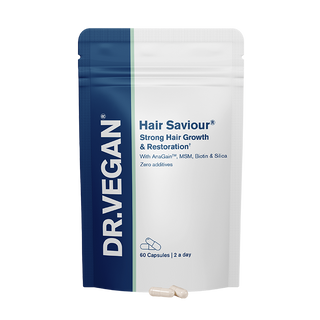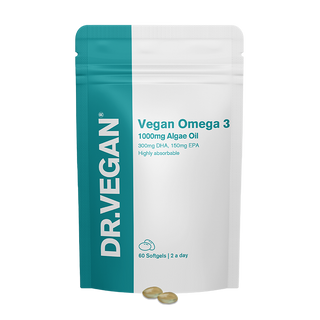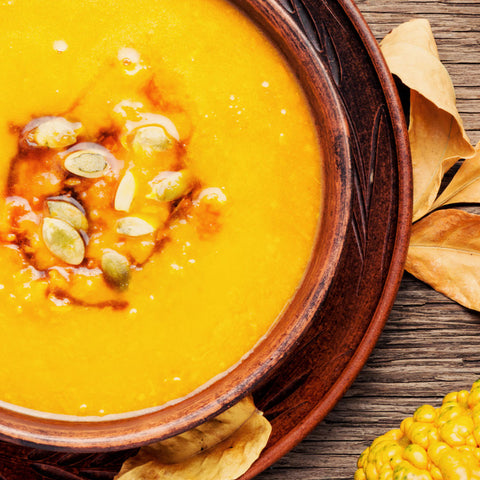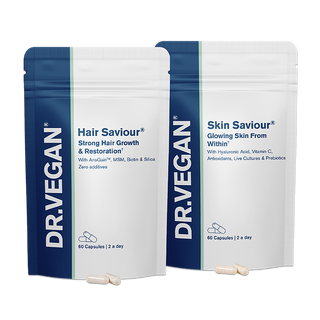How to Combat Dry Scalp: Tips for Prevention

Having a dry scalp can be frustrating, uncomfortable and embarrassing for some. There are a variety of factors that can contribute towards a dry scalp, including cold weather, hot showers, harsh hair products, and poor diet. Our nutritionists share a number of ways you can improve a dry scalp, including dietary changes as well as some home remedies that can help.
What Causes Dry Scalp?
Dandruff
Dandruff is a common condition often mistaken for dry scalp. Both conditions cause flaking and itching, however dandruff is caused by the fungus Malassezia, which feeds on oils on the scalp. For treatment, nutritionists recommend trying antifungals, preferably natural ones like coconut tea tree oil.
Nutrition is important and we recommend reading '5 key nutrients for healthy hair'.
Eczema and Psoriasis
Sometimes, the cause of a dry scalp is eczema or psoriasis. These are both caused by abnormal immune function. It is worth getting your scalp checked over by a doctor who can make an appropriate diagnosis.
What Vitamins Are Good For a Dry Scalp?
Diet plays a massive part in the health of skin, including the scalp. Nutrient deficiencies may contribute towards a dry and flaky scalp. Here are the key nutrients to look out for in your diet.
Not sure what your body needs? Create your Diet Profile.
Biotin and B Vitamins
B Vitamins are needed in high quantities for skin cells and their normal function. Try increasing the consumption of sweet potatoes, leafy greens and wholegrains, or look for a supplement containing Biotin.
Vitamin C
Vitamin C is needed for the maintenance of collagen, an important factor in skin health. The best way to increase your Vitamin C levels is through consuming more citrus fruits and raw salads.
Be cautious of taking collagen supplements, we recommend reading our short article 'the truth about collagen' first.
Hair Saviour®

Vitamin E
Vitamin E is a fat-soluble antioxidant that protects skin cells from environmental damage. Nuts, seeds and whole grains provide Vitamin E, as well as avocados and olives. You may be wondering, "Should I take a Multi-Vitamin every day?", and we recommend taking your Diet Profile or reading our expert article on Daily Multi-Vitamins to help decide.
Vitamin E is also noted as one of our 7 key nutrients to support your eye health as it is a fat-soluble antioxidant, which may help protect cell membranes in the eye from being damaged.
Omega-3
Omega 3 fats are essential for the moisturisation of skin. When not enough is consumed, it leads to dry, flaky, itchy skin and scalp. Recommended foods to increase your intake of Omega 3 are walnuts, chia seeds, a vegan Omega-3 supplement, as well as other nuts and seeds.
Vegan Omega 3

Zinc
Zinc helps to regulate skin cell turnover and may help with flaky skin and scalp. Zinc rich foods include nuts, seeds, beans, chickpeas and lentils.
Taking supplements that boost your intake of vital skin nutrients help improve the condition of your scalp.
Find out why Zinc is so important for your immune system, hair, and skin from leading nutritionists.
Which Foods are Good for Dry Scalp?
A healthy diet can significantly improve the condition of your scalp. Here are some foods that are beneficial for a dry scalp:
Fatty Fish
Rich in omega-3 fatty acids, salmon, mackerel, and sardines help to maintain scalp health and reduce dryness.
Nuts and Seeds
Walnuts, flaxseeds, and chia seeds are excellent sources of omega-3 fatty acids and zinc, which promote scalp hydration.
Avocados
Packed with healthy fats and vitamin E, avocados can help to keep your scalp moisturized.
Leafy Greens
Spinach and kale are high in vitamins A and C, which support the production of sebum, a natural scalp oil.
Eggs
A great source of protein and biotin, eggs can help to strengthen hair and improve scalp health.
Sweet Potatoes
High in beta-carotene, which the body converts to vitamin A, sweet potatoes can help to promote a healthy scalp.
Berries
Rich in antioxidants and vitamins, berries can help to protect your scalp from oxidative stress and inflammation.
Carrots
High in vitamin A, carrots can help to maintain the health of your scalp and hair.
Yoghurt
Contains probiotics that can help to improve gut health, which in turn can benefit your scalp.
Oysters
A great source of zinc, which is essential for scalp health and can help to reduce dryness and flakiness.
Incorporating these foods into your diet can help to improve the health and hydration of your scalp.
What Food Should You Avoid for Dry Scalp & Dandruff
Maintaining a healthy scalp starts with your diet. Certain foods can exacerbate dryness and dandruff, so it's important to know what to avoid.
Sugary Foods
Foods high in sugar can trigger inflammation in the body, which may lead to a dry scalp. Try to limit your intake of sugary snacks, desserts, and beverages.
Processed Foods
Processed foods, including fast food, chips, and packaged snacks, often contain unhealthy fats and preservatives that can contribute to scalp dryness and dandruff.
Alcohol
Excessive alcohol consumption can dehydrate your body, including your scalp. This can lead to dryness and flakiness. Moderation is key to maintaining scalp health.
Caffeine
Like alcohol, caffeine can also have a dehydrating effect on your body. Reducing your intake of caffeinated drinks such as coffee, tea, and energy drinks can help keep your scalp hydrated.
Avoiding these foods can help reduce dryness and inflammation, promoting a healthier scalp and reducing dandruff.
Omega-3 is one of our recommended best nutrients to support skin.
How to Treat Dry Scalp
Professional treatments
Glycolic acid and coal tar are used in professional treatments. Glycolic acid exfoliates, removes dead skin and promotes cell turnover. Coal tar reduces inflammation and itching. There are downsides to using these however, so it is preferable to improve the diet first.
Treatment at Home
Apple cider vinegar
Mix in equal parts water and apply to the scalp. Leave for a few minutes before rinsing. The acidity helps balance the scalp pH, reducing dryness and itching.
Coconut oil
A medicinal review of coconut oil for the scalp suggests to massage the coconut oil into the scalp and leave for 30 minutes. Coconut oil moisturises and soothes, reducing dryness and inflammation.
Want to discover more about nutrition and DR.VEGAN®? View our range of vegan vitamins and supplements
Want to hear more from our nutritionists? Sign up to our email newsletter for insights and exclusive offers:




















